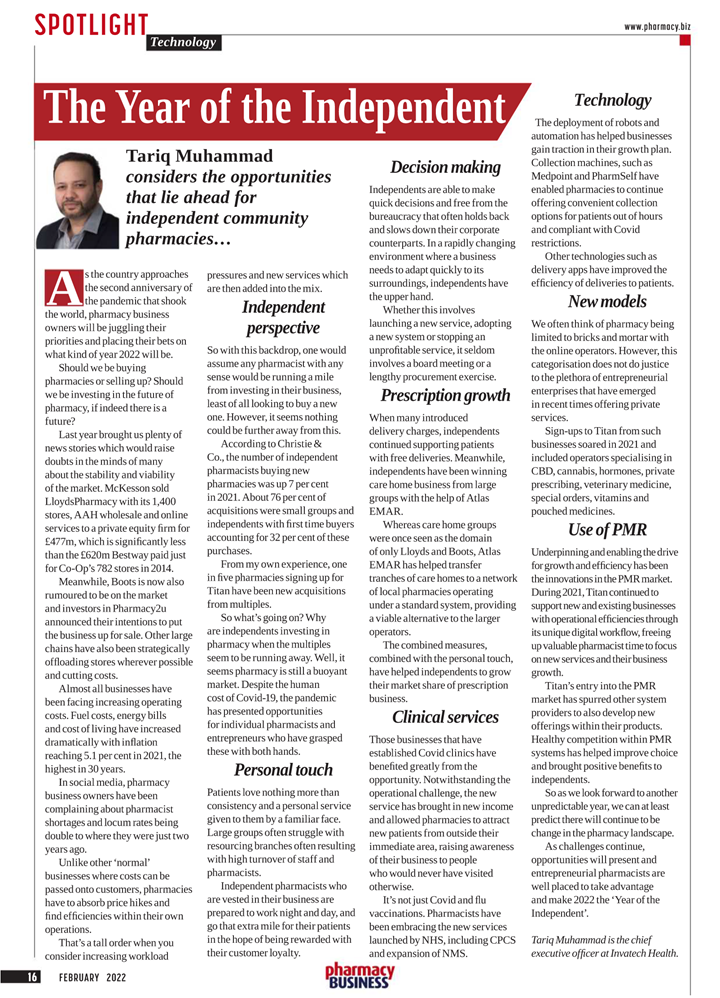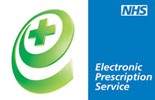Year Of The Independent
As the country approaches the second anniversary of the pandemic that shook the world, pharmacy business owners will be juggling their priorities and placing their bets on what kind of year 2022 will be. Should we be buying pharmacies or selling up? Should we be investing in the future of pharmacy, if indeed there is a future?
Last year brought us plenty of news stories which would raise doubts in the minds of many about the stability and viability of the market. McKesson sold LloydsPharmacy with its 1400 stores, AAH wholesale and online services to a private equity firm for £477m, which is significantly less than the £620m Bestway paid just for Co-Op’s 782 stores in 2014. Meanwhile, Boots is now also rumoured to be on the market and investors in Pharmacy2u announced its intentions to put the business up for sale. Other large chains have also been strategically offloading stores wherever possible and cutting costs.
Almost all businesses have been facing increasing operating costs. Fuel costs, energy bills and cost of living have increased dramatically with inflation reaching 5.1% in 2021, the highest in 30 years. In social media, pharmacy business owners have been complaining about pharmacist shortages and locum rates being double to where they were just two years ago.
Unlike other ‘normal’ businesses where costs can be passed onto customers, pharmacies have to absorb price hikes and find efficiencies within their own operations. That’s a tall order when you consider increasing workload pressures and new services which are then added into the mix.
Independent Perspective
So with this backdrop, one would assume any pharmacist with any sense would be running a mile from investing in their business, least of all looking to buy a new one. However, it seems nothing could be further away from this. According to Christie & Co, the number of independent pharmacists buying new pharmacies was up 7% in 2021. 76% of acquisitions were small groups and independents with first time buyers accounting for 32% of these purchases. From my own experience, 1 in 5 pharmacies signing up for Titan have been new acquisitions from multiples.
So what’s going on? Why are independents investing in pharmacy when the multiples seem to be running away. Well, it seems pharmacy is still a buoyant market. Despite the human cost of Covid-19, the pandemic has presented opportunities for individual pharmacists and entrepreneurs who have grasped these with both hands.
Personal Touch
Patients love nothing more than consistency and a personal service given to them by a familiar face. Large groups often struggle with resourcing branches often resulting with high turnover of staff and pharmacists. Independent pharmacists who are vested in their business are prepared to work night and day, and go that extra mile for their patients in the hope of being rewarded with their customer loyalty.
Decision Making
Independents are able to make quick decisions and free from the bureaucracy that often holds back and slows down their corporate counterparts. In a rapidly changing environment where a business needs to adapt quickly to its surroundings, independents have the upper hand. Whether this involves launching a new service, adopting a new system or stopping an unprofitable service, it seldom involves a board meeting or a lengthy procurement exercise.
Prescription Growth
When many introduced delivery charges, independents continued supporting patients with free deliveries. Meanwhile, independents have been winning care home business from large groups with the help of Atlas EMAR. Whereas care home groups were once seen as the domain of only Lloyds and Boots, Atlas EMAR has helped transfer tranches of care homes to a network of local pharmacies operating under a standard system, providing a viable alternative to the larger operators. The combined measures, combined with the personal touch, have helped independents to grow their market share of prescription business.
Clinical Services
Those businesses that have established Covid clinics have benefited greatly from the opportunity. Notwithstanding the operational challenge, the new service has brought in new income and allowed pharmacies to attract new patients from outside their immediate area, raising awareness of their business to people who would never have visited otherwise. It’s not just Covid and flu vaccinations. Pharmacists have been embracing the new services launched by NHS, including CPCS and expansion of NMS.
Technology
The deployment of robots and automation has helped businesses gain traction in their growth plan. Collection machines, such as Medpoint and PharmSelf have enabled pharmacies to continue offering convenient collection options for patients out of hours and compliant with Covid restrictions. Other technologies such as delivery apps have improved the efficiency of deliveries to patients.
New Models
We often think of pharmacy being limited to bricks and mortar with the online operators. However, this categorisation does not do justice to the plethora of entrepreneurial enterprises that have emerged in recent times offering private services. Sign ups to Titan from such businesses soared in 2021 and included operators specialising in CBD, cannabis, hormones, private prescribing, veterinary medicine, special orders, vitamins and pouched medicines.
Use of PMR
Underpinning and enabling the drive for growth and efficiency has been the innovations in the PMR market. During 2021, Titan continued to support new and existing businesses with operational efficiencies through its unique digital workflow, freeing up valuable pharmacist time to focus on new services and their business growth. Titan’s entry into the PMR market has spurred other system providers to also develop new offerings within their products. Healthy competition within PMR systems has helped improve choice and brought positive benefits to independents.
So as we look forward to another unpredictable year, we can at least predict there will continue to be change in the pharmacy landscape. As challenges continue, opportunities will present and entrepreneurial pharmacists are well placed to take advantage and make 2022 the Year of the Independent.










